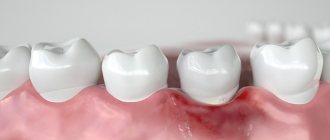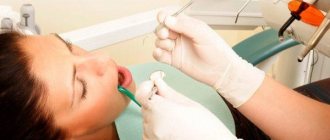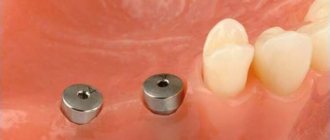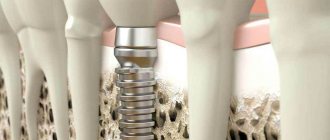What does pain depend on?
How long does the pain last? Localization of pain Pain during implantation Pain during prosthetics How to reduce pain? When to urgently consult a doctor? What to do if your jaw and gums hurt after dental implantation? Is this considered normal and how long can it last? Do I have to endure it? Let's look at it in more detail in our article.
During the implantation of a titanium rod into the bone, a puncture is made in the gums, and tissues and blood vessels are consequently injured, so pain, swelling or slight bleeding is a normal response of the body.
The implantation itself takes place without pain, since the procedure for installing an artificial tooth root is carried out under anesthesia. After its effect ends, sensitivity returns, an aching, throbbing pain syndrome appears, it should go away on the 10th day or earlier.
What does pain depend on during rehabilitation, on what days what sensations should be felt?
Pain after implantation begins when the anesthetic effect of the anesthetic drug ends. After 1.5-2 hours
.
Some tissue numbness may also be present. After 5-7 hours
, if normal sensitivity does not appear, you should consult a doctor, because There is a risk of damage to the facial nerve. Severe pain after dental implantation in the lower jaw can also be caused by trauma to the trigeminal nerve, because it is in close proximity to the roots.
The severity and degree of pain depends on:
- depending on the number of implants installed: one or several;
- depending on the type of operation: for implantation, the gum tissue was cut, followed by sutures - patchwork method (in rare cases) or a puncture was made (transgingival method);
- on the individual characteristics of the patient’s body, his pain threshold;
- from additional surgical interventions: sinus lifting, bone tissue augmentation, etc.
How long does pain last after dental implant placement?
Let's consider the normal postoperative course of the condition.
1-5 day
. The pain may increase during the first few days, starting from the moment the anesthetic administered before implantation wears off. It can be aching, throbbing, and worsened by tilting the head. While this does not indicate a complication, this is the body’s natural response to intervention. As well as swelling of the tissues in the area of the implant.
5-10 day
. By the 5th day the pain subsides. The swelling subsides completely. The question remains for the patient: how much does the gum hurt after installing the implant, since it is still sensitive. By the 10th day, as a rule, everything goes away.
After 2-6 months
. There are times when everything goes fine, but after a few months or even a year a person complains that the tooth implant around it hurts. Possible reasons:
- loosening
of the plug, adaptation crown on the abutment. They rub the soft gum tissue. The situation is not critical. The dentist will adjust, carry out the necessary manipulations and you don’t have to worry about the safety of the implant;
implant rejection An unfavorable outcome of the entire implantation is unsuccessful osseointegration. The body did not accept the artificial tooth root. Fortunately, the rejection rate is close to 1%;- inflammatory
gum diseases. This is often due to poor hygiene and violation of the doctor’s postoperative recommendations; - injury
to the jaw nerve, then the jaw hurts after implantation.
If your gums, jaw, or ear hurt for more than 10 days after dental implantation, do not put off visiting the doctor who performed the operation. Early diagnosis and initiation of treatment will avoid complications. Calling after two weeks or more with such symptoms may delay treatment for a longer period.
Crown or implant: which design to choose?
After a complete examination and passing the necessary tests, you can move on to the next step - surgery and choosing a design for the future tooth. “Which is better to get: a crown or an implant?” - This is a question the dentist hears many times from patients. Not everyone understands the intricacies of dental techniques; people often confuse these concepts, meaning “implantation” and “prosthetics”. What is the difference between an implant and a crown? An implant is a titanium root that is implanted directly into the bone tissue; it is also an artificial root and support. The crown is the visible part, attached to the abutment (transitional element to the titanium rod). Implantation is the most reliable way to restore the functionality and aesthetic appearance of the dentition.
dental implant crown
Installing a crown on an implant: stages of the procedure.
Dentistry uses various methods to restore the beauty, naturalness and functionality of a smile. For each individual case, the surgical procedure and recovery period will differ. How long does it take to place a crown on an implant? Initially, the titanium screw itself is installed, after which it will take from 4 to 6 months until complete engraftment; it will also take several weeks to form the contour of the gum around the future tooth. Placing a crown on an implant is the final stage in restoring the dentition. This is the most anticipated moment for the client, because he will be able to enjoy the reflection of a perfect smile in the mirror, feel the new tooth to the touch, smile without hesitation and eat his favorite food.
implant or crown
Pain depending on location and specificity, what does it mean?
Unpleasant sensations can be of a different nature, as well as their location.
- Pulsation at the implantation site, tingling, itching can be either normal or a sign of an allergic reaction to the material. You should continue to take antihistamines (as agreed with your doctor) and monitor the course of such manifestations;
- The unit located next to the installed artificial root is alarming. This may indicate nerve damage, gum inflammation or unsuccessful implantation, or it is possible that the crown is pressing, so the adjacent tooth hurts after the implant is installed;
- Severe pain in the ear after dental implantation in the lower jaw, which does not go away within a week, may indicate a violation of the integrity of the trigeminal nerve. The cause may be an incorrectly installed implant or injury from an instrument when preparing the bed;
- The answer to the question of why and how much gum pain after implant installation depends on the person’s health. Normally, the gums may ache for 5-7 days
. By the day the sutures are removed, usually on the 7th day, the pain goes away; - Bursting pain near the implant, the appearance of pus with light pressure, and temperature may indicate an inflammatory process. The main thing is to prevent the infection from joining. You should immediately consult a doctor.
Causes of pain
Severe pain during implant healing may be due to:
- Mistakes made by the doctor. It is very important to trust your oral health to an experienced implantologist. You should not skimp on choosing a dental clinic and doctor. Illiterate selection of medical instruments and equipment, violation of the rules of asepsis and antisepsis, improper preparation for surgical procedures or its complete absence, refusal to perform bone grafting in cases of severe bone tissue deficiency, traumatic actions during prosthetics - all these are factors directly related to the activities of the implantologist. And they are the ones that can lead to pain during the rehabilitation period.
- Incorrect behavior of the patient. It is very important that a person strictly follows all medical instructions and carries out the appointments. It is unacceptable to eat solid food until the implant has taken root well. You should not take medications thoughtlessly. It is prohibited to drink alcohol-containing drinks. Under no circumstances should you visit a sauna or bathhouse in the first month after implant installation.
- Opening of bleeding during implantation of a titanium root. This sometimes happens if the patient’s blood pressure has sharply increased or tachycardia has developed against the background of excitement.
- Violation of the integrity of the maxillary sinus. It only happens when you work carelessly with the upper teeth. In this case, the integrity of the nerve endings is damaged, which negatively affects recovery.
- Formation of an extensive hematoma. Then it puts pressure on the nerves and blocks conductive impulses. As a result, recovery processes cannot proceed normally in the operated area.
Pain during implantation, is it painful to install an implant?
For those who were once familiar with the removal of eights (wisdom teeth), they know how unpleasant it is. Implantation is a completely painless operation. The anesthesia is enough to make everything comfortable. The patient feels manipulation in the oral cavity, but there is no pain. Even the injection itself with an anesthetic solution can be made invisible. After treating the puncture site with special means.
There are several types of anesthesia for implantation:
- local
, used in most cases.
It is quite enough for work. An injection is given and within a few minutes the medicine begins to act. Installation of one implant takes 15-30 minutes
, and the effect of anesthesia ends after a few hours; - sedation
_ The patient is half asleep, there are no unpleasant sensations, but there may be consequences; - anesthesia
_ To undergo implantation under anesthesia, you will need to undergo certain tests and consult an anesthesiologist. Coming out of anesthesia takes time. This method is used very rarely, it is not available in all clinics and can be dangerous.
How to Reduce or Prevent Pain During Recovery, Do's and Don'ts
In the postoperative period, the main thing is to strictly follow all the doctor’s recommendations. Basic:
- in the first hours after implantation, do not eat or drink;
- the first days (about a week) eat liquid foods: soups, purees, baby food;
- exclude hot, cold, spicy, alcohol;
- After surgery, apply cold compresses to relieve swelling;
- take prescribed medications strictly according to the schedule. Do not cancel them yourself if you feel better;
- make mouth baths using antiseptics: chlorhexidine, chamomile;
- sleep on a high pillow and on the opposite operating side;
- forget about physical activity for a while;
- Going to bathhouses and saunas is prohibited.
Usually, every dental clinic has a reminder about what is possible after implantation, what is prohibited, how to relieve pain after dental implantation, and a schedule for visiting the doctor.
The doctor will definitely prescribe painkillers - Nurofen, Nimesil, Analgin, Nise, etc. They need to be taken as long as the pain lasts after installing the dental implant, up to 7-10 days. If it persists longer, it is better to contact your dentist.
Memo for patients after implantation
There are fairly simple rules that reduce the likelihood of postoperative complications. Anyone planning to install an implant should know about them:
- In the first few days, pain is normal. If it is very strong, you need to take painkillers prescribed by your doctor.
- In the first week after surgery, it is important to avoid overheating and hypothermia.
- From the first to the seventh day after implantation, you should eat only soft and liquid foods. It should not be too cold or hot.
- For the speedy healing of gums, you need to maintain oral hygiene. It is better to use a new brush with soft bristles. Do not rub in the implantation area.
- It is forbidden to rinse your mouth vigorously. For speedy healing, doctors recommend so-called oral baths. During them, the patient takes an anti-inflammatory solution into the cheek and calmly holds it for several minutes. Then he spits and repeats the procedure from the beginning.
- In order to recognize complications in time, in the first week after dental surgery you need to measure your body temperature in the morning and evening.
- Do not smoke for two weeks after implantation.
People who take a responsible approach to the rehabilitation period are much less likely to encounter postoperative complications.
What if the implant gets sick long after surgery?
Peri-implantitis is insidious; it can occur unnoticed. After some time, there will be a sharp or bursting pain, radiating even to the nose, ear, head, face. This indicates inflammation of the tissue around the artificial root. Complaint: the tooth implant hurts; it is incorrect in this case. After all, the implant itself cannot hurt; it is a non-living structure, but the soft tissue around it can. The main thing is not to wait as long as you are willing to endure, but to go to the clinic urgently.
Peri-imlantitis on x-ray
The body is not always ready to accept a foreign object and osseointegrate with it. Rejection is extremely rare - less than 1.5% of cases. But you must always monitor your well-being.










